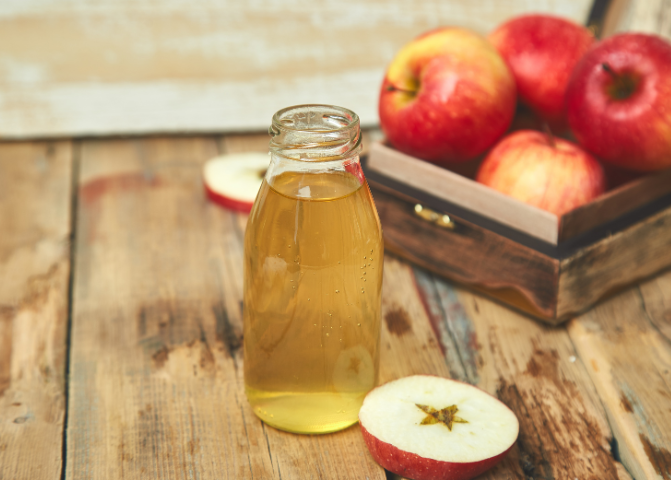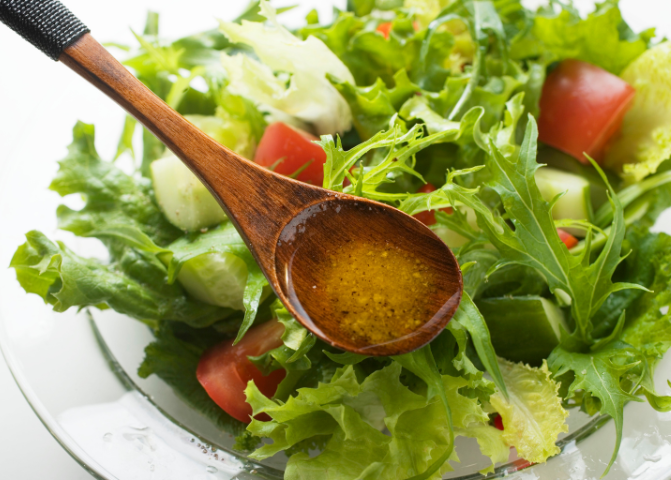Top 7 Health Benefits of Apple Cider Vinegar, Backed By Science

Table of Contents
What is apple cider vinegar and why is it so popular? Below we look at 7 health benefits that this special fermented juice provides.
Apple cider vinegar has been in use for hundreds of years to treat coughs and infections. Today, apple cider vinegar is heralded as a weight loss aid, acid reflux remedy and much more.
What is apple cider vinegar?
Apple cider vinegar is apple juice that has been fermented a couple of times. Crushed apples are blended with yeast, sugar, or any other carbohydrate. After a few days, natural bacteria and yeasts ferment the juice, converting the carbohydrates into alcohol. Following this, a second fermentation process converts the alcohol into acetic acid.
You can purchase pasteurized or raw apple cider vinegar from supermarkets, health food stores and pharmacies. People most often use raw apple cider vinegar for health reasons because they contain more natural bacteria and yeast. Raw apple cider vinegar is considered a source of:
7 health benefits of apple cider vinegar
Here are seven major benefits of consuming apple cider vinegar:
Losing weight with apple cider vinegar
Apple cider vinegar is known to have appetite-suppressing properties. Research indicates that when consumed before a meal, it has the ability to reduce appetite, increase feelings of fullness, and expedite the sensation of satiety, potentially aiding in the management of obesity. In fact, a study demonstrated that individuals dealing with obesity, who incorporated acetic acid (the primary component in apple cider vinegar) into their diets over a span of 12 weeks, experienced notable reductions in weight, abdominal fat, and waist circumference.
How does it contribute to weight loss?
In addition to appetite suppression, apple cider vinegar (ACV) may impact weight loss through several potential mechanisms:
- Metabolism: Limited evidence suggests that ACV might have a minor effect on increasing metabolism, potentially aiding in burning more calories. However, the impact is not substantial.
- Fat Loss: Some studies indicate that ACV may lead to reduced body fat, particularly in the abdominal area. Yet, research results are not consistent across all studies.
- Digestive Health: ACV is believed to promote better digestion, indirectly influencing weight management by enhancing nutrient absorption.
It’s important to emphasize that apple cider vinegar is not a miraculous solution for weight loss. While it may offer some potential benefits, it should be part of a holistic weight loss plan that includes a balanced diet, regular exercise and weight loss medications if clinically appropriate. Additionally, ACV is acidic and can be harsh on tooth enamel and the digestive system, so it’s crucial to consume it in moderation and diluted with water.
Always consult with a healthcare professional before incorporating ACV into your weight loss regimen, especially if you have underlying health conditions. Individual responses to ACV can vary, and its effectiveness may differ from person to person.
Controlling diabetes with apple cider vinegar
Another main use of apple cider vinegar is its ability to lower blood sugar levels. It improves insulin sensitivity and the body’s blood sugar response after meals. A 2007 study indicated that two tablespoons of vinegar at bedtime decreased fasting glucose by 4 to 6 per cent.
Relieving digestive problems with apple cider vinegar
Apple cider vinegar can delay gastric emptying. Suppose you plan to consume a sinful meal that could disturb your stomach, sip a glass of warm water mixed with a teaspoon of apple cider vinegar twenty minutes before dining. The vinegar reduces acid reflux and has antibiotic features that can fight the bacterial infection. It also contains pectin, which can control intestinal spasms.
Improving heart health with apple cider vinegar
Scientists think that apple cider vinegar can lower cholesterol and triglyceride levels, consequently boosting your heart health. It contains the antioxidant chlorogenic acid that prevents LDL (bad) cholesterol particles from getting oxidised, which is an important step in developing heart disease. The wonder tonic also lowers blood pressure, another risk factor for cardiac diseases.
Glowing skin with apple cider vinegar
Here’s another benefit of keeping apple cider vinegar in your kitchen — it can be beneficial as a skin cream. Just rub it gently on your face with a cotton ball for a healthy glow. The natural alpha-hydroxy acids and acetic acid boost circulation, close pores and decrease acne. The useful ingredient also decreases the impact of blemishes, dry skin, psoriasis and eczema.
Soothing a sore throat with apple cider vinegar
Apple cider vinegar is effective for removing throat irritants. Mix a quarter cup with an equal amount of warm water and gargle a couple of times a day or sip a cup of hot water with an apple cider vinegar and honey. This practice would soothe the sore throat.
Hair care with apple cider vinegar
Include apple cider vinegar in your final rinse. As the vinegar is acidic, its acidity maintains the pH balance of your hair without disrupting its content of natural oils. As a result, hair becomes smooth, soft and silky. Its antibacterial and antifungal ingredients can help manage scalp itch, dryness, and dandruff.
What are the risks/side effects of apple cider vinegar?
Apple cider vinegar has a high acidity that can damage tooth enamel. It can also affect your food pipe if you drink it quickly and without water. Other rare yet possible side effects of apple cider vinegar are:
● Hypokalemia (low potassium): Don’t consume apple cider vinegar if you have low potassium levels (hypokalemia), as it can make the condition worse.
● Interactions with medicines: Apple cider vinegar can interact with some medications, such as insulin and diuretics. If you are taking any of these medications, ask your doctor about the safe use of apple cider vinegar.
● Nausea and vomiting: Some individuals can not bear the taste and acidity of apple cider vinegar. It can lead them to develop nausea and vomiting.
Apple Cider Vinegar Recipes
Apple cider vinegar (ACV) can be used in various delicious recipes and health drinks to add flavor and potential health benefits.
Homemade Apple Cider Vinegar Salad Dressing

Ingredients:
3 tablespoons extra-virgin olive oil
1 tablespoon apple cider vinegar
1 teaspoon honey or maple syrup (adjust to taste)
1/2 teaspoon Dijon mustard
Salt and pepper to taste
Instructions:
1. In a small bowl or jar, combine the extra-virgin olive oil and apple cider vinegar. Mix well.
2. Add the honey or maple syrup for a touch of sweetness. Adjust the amount to suit your taste preferences.
3. Incorporate the Dijon mustard to add depth and a hint of tanginess to the dressing.
4. Season the mixture with salt and pepper to taste. Be cautious with the salt, as ACV can already be quite tangy.
5. Whisk or shake the ingredients vigorously until they emulsify and form a smooth dressing.
6. Taste the dressing and adjust the sweetness, acidity, or seasonings to your liking. You can also add herbs, minced garlic, or shallots for extra flavor if desired.
7. Use the dressing immediately to drizzle over your favorite salad, or store it in an airtight container in the refrigerator for future use.
This dressing is not only great on salads but can also be used as a marinade for grilled vegetables, as a dip for fresh vegetables, or as a flavor enhancer for various dishes.
Feel free to experiment with different ingredients and proportions to create a dressing that suits your taste preferences. Homemade dressings like this one allow you to control the quality of the ingredients and avoid the preservatives often found in store-bought options.
Apple Cider Vinegar and Honey Drink

Ingredients:
1 cup of water
2 tablespoons of apple cider vinegar
1-2 tablespoons of honey (adjust to taste)
1-2 slices of fresh lemon (optional, for added flavor)
Ice cubes (optional, for a chilled drink)
Instructions:
1. In a glass, add the water. You can use cold, warm, or room temperature water, depending on your preference.
2. Stir in the apple cider vinegar. Make sure it’s well mixed with the water.
3. Add the honey to the mixture. The amount of honey can be adjusted to your desired level of sweetness. Stir well until the honey dissolves.
4. If you like, squeeze a slice of fresh lemon into the drink for added flavor. You can also add lemon slices for visual appeal.
5. If you prefer a cold beverage, you can add ice cubes to the glass.
6. Stir the mixture one final time to ensure all the ingredients are well combined.
7. Enjoy your homemade apple cider vinegar and honey drink. It’s a great way to start your day or as a healthy, tangy refreshment.
This drink is not only refreshing but also believed to have potential health benefits, including aiding digestion and providing a source of antioxidants. It’s a delightful alternative to sugary beverages and can be enjoyed as part of a balanced diet.
Remember to use raw, unfiltered apple cider vinegar for the best potential health benefits. If you’re new to apple cider vinegar, you may want to start with a smaller amount and gradually increase it as you become accustomed to the taste.
Apple Cider Vinegar Detox Drink

Ingredients:
1 to 2 tablespoons of raw, unfiltered apple cider vinegar
1 cup of water (room temperature or warm)
1 to 2 teaspoons of fresh lemon juice (adjust to taste)
1 teaspoon of honey or maple syrup (optional, for sweetness)
A pinch of cayenne pepper (optional, for a little heat)
Instructions:
1. Pour the water into a glass.
2. Add 1 to 2 tablespoons of raw, unfiltered apple cider vinegar to the water. Start with 1 tablespoon if you’re new to the taste, and adjust as needed.
3. Squeeze in 1 to 2 teaspoons of fresh lemon juice. This adds a zesty flavor to the drink.
4. If you prefer a touch of sweetness, stir in 1 teaspoon of honey or maple syrup. Adjust the sweetness to your liking.
5. For a little heat and an extra metabolism boost, you can add a pinch of cayenne pepper. Be cautious with the amount, as cayenne can be quite spicy.
6. Stir the mixture well until all the ingredients are combined.
7. Enjoy your apple cider vinegar detox drink. You can have it in the morning or throughout the day as a healthy and hydrating beverage.
This detox drink is not only refreshing but also thought to support digestion, boost metabolism, and provide a dose of antioxidants. However, it’s essential to use apple cider vinegar in moderation and be mindful of your body’s response, as it can be acidic and may not be suitable for everyone. Adjust the ingredients to your taste and dietary preferences.
Certainly, here’s a simple and versatile apple cider vinegar marinade that can be used for various proteins, such as chicken, pork, or tofu. This marinade adds a tangy and slightly sweet flavor to your dishes.
Apple Cider Vinegar Marinade

Ingredients:
1/2 cup apple cider vinegar
1/4 cup olive oil
2 cloves garlic, minced
2 tablespoons honey or maple syrup
1 teaspoon Dijon mustard
1 teaspoon dried thyme (or fresh thyme leaves)
Salt and pepper to taste
Instructions:
1. In a bowl, combine the apple cider vinegar, olive oil, minced garlic, honey or maple syrup, Dijon mustard, and dried thyme.
2. Season the marinade with salt and pepper to taste. Be cautious with the salt, as the marinade will absorb into the protein, and you can adjust the seasoning later.
3. Whisk the mixture thoroughly until all the ingredients are well blended.
4. Place your protein (chicken, pork, tofu, etc.) in a resealable plastic bag or a shallow dish.
5. Pour the marinade over the protein, ensuring it’s well coated. Seal the bag or cover the dish and refrigerate for at least 30 minutes, but ideally for a few hours or overnight for better flavor absorption.
6. When you’re ready to cook, remove the protein from the marinade and discard the used marinade.
7. Grill, bake, or cook your protein as desired. The marinade will add a delicious tangy and sweet flavor to your dish.
This apple cider vinegar marinade works well for a variety of meats and plant-based proteins, and it can add a flavorful twist to your meals. Feel free to adjust the ingredients to your taste preferences and experiment with different herbs and spices to create variations of this versatile marinade.
Booking a Free Weight Loss Consultation
Looking to get in better shape? Your path to a healthier you begins with a simple conversation with a Medmate healthcare professional. Medmate’s Clinican Led Weight Management service starts by completing a short registration form. One of our friendly nurses will give you a free call for a quick chat to explain how everything works.. Register for a weight loss consultation with this expression of interest form and we will be in touch shortly.
Key Takeaway
Apple cider vinegar is prepared from the fermentation of apples. It has many health benefits, from decreasing weight to glowing skin. Its side effects are rare and can be avoided if it is consumed carefully. If you’re taking regular medications, you should consult your doctor about the safe use of apple cider vinegar.
References
1. Johnston, C. S., & Gaas, C. A. (2006). Vinegar: medicinal uses and antiglycemic effect. MedGenMed : Medscape general medicine, 8(2), 61.
2. Halima, B. H., Sonia, G., Sarra, K., Houda, B. J., Fethi, B. S., & Abdallah, A. (2018). Apple Cider Vinegar Attenuates Oxidative Stress and Reduces the Risk of Obesity in High-Fat-Fed Male Wistar Rats. Journal of medicinal food, 21(1), 70–80. https://doi.org/10.1089/jmf.2017.0039
3. Beh, B. K., Mohamad, N. E., Yeap, S. K., Ky, H., Boo, S. Y., Chua, J., Tan, S. W., Ho, W. Y., Sharifuddin, S. A., Long, K., & Alitheen, N. B. (2017). Anti-obesity and anti-inflammatory effects of synthetic acetic acid vinegar and Nipa vinegar on high-fat-diet-induced obese mice. Scientific reports, 7(1), 6664. https://doi.org/10.1038/s41598-017-06235-7
4. Hlebowicz, J., Darwiche, G., Björgell, O., & Almér, L. O. (2007). Effect of apple cider vinegar on delayed gastric emptying in patients with type 1 diabetes mellitus: a pilot study. BMC gastroenterology, 7, 46. https://doi.org/10.1186/1471-230X-7-46
5. Petsiou, E. I., Mitrou, P. I., Raptis, S. A., & Dimitriadis, G. D. (2014). Effect and mechanisms of action of vinegar on glucose metabolism, lipid profile, and body weight. Nutrition reviews, 72(10), 651–661. https://doi.org/10.1111/nure.12125
6. Ostman, E., Granfeldt, Y., Persson, L., & Björck, I. (2005). Vinegar supplementation lowers glucose and insulin responses and increases satiety after a bread meal in healthy subjects. European journal of clinical nutrition, 59(9), 983–988. https://doi.org/10.1038/sj.ejcn.1602197
Join the Medmate Community!
Receive free expert health advice from Australian doctors and health advisors. Join the Medmate community now - just what the doctor ordered.
Health Information I Medication Education & Tips I Patient Stories & Videos.



